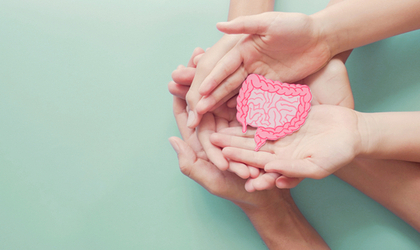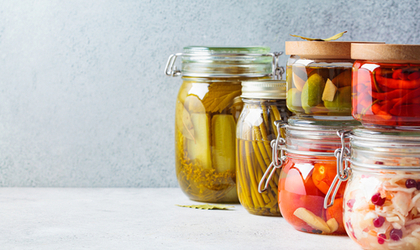
The interest in gut health has increased exponentially in recent years. Although the scientific research is still preliminary, the more we understand the gut microbiome, the more we see it’s the intersection point for various health conditions and diseases, especially those concerning the immune system, metabolism and mood (4).
Is there anything the gut microbiome is not involved in?
We can’t forget that our microbial friends were here first; we’ve co-evolved with them since the dawn of human history. There’s never been a time when our brain or body has existed without signals coming from microbes. And so, it’s no surprise to learn the gut microbiome pretty much affects everything. This bustling, complex community holds the key to good health and ill health.
Based on the scientific data available, there are more than 1000 distinct species of bacteria in the gut – and each of them supports your body in different ways (6).
The American Gut Project
Founded in 2012, The American Gut Project (part of The Microsetta Initiative) published a huge paper on the collective American microbiome (7). Researchers assessed the strains of bacteria implicated in different health conditions. The study revealed that we could begin to ascribe changes to people’s health with enough metadata (information collated at a population level) in the gut microbiome. Soon, we could live in a world where health professionals test our gut microbiome in the same way they test our blood to determine the best course of treatment.
Did you know?
The trillions of bacteria in the lower part of our digestive tract outnumber our human cells. Essentially, this means we are more bacteria than we are human (5).
The gut-brain-connection
Humans have always known to trust our intuition, that overwhelming and powerful instinct we can’t explain. The term ‘gut feeling’ says it all. And as research into the human microbiome continues, the connection between gut health and mental health becomes more and more compelling. It seems a healthy gut can buffer us against stress and safeguard our psychological well being.
Go with your gut
Ever experienced that swoony sensation in your belly, especially when you’re nervous or excited? The ‘butterflies’ mean you’re getting signals from your second brain: your gut.
Digestive issues and mood disorders
Digestive issues, such as bloating, constipation, nausea and abdominal pain, have been closely associated with anxiety and stress. For years, scientists believed mood disturbances contributed to digestive problems. However, new research suggests irritation of the gastrointestinal system may also be responsible for psychological changes (9). Clearly, digestive issues and mood disorders have a complex, mutually reinforcing relationship.
Did you know?
Your gut bacteria manufacture around 90 per cent of the body’s serotonin, an important neurotransmitter that influences mood and gastrointestinal activity (8).
The gut-brain axis
Scientists have discovered a stunningly complex neural network that connects the brain and the gut. This sophisticated communication system is referred to as the ‘gut-brain axis’. The gut is connected to the brain via the vagus nerve: it runs from the gut to the amygdala, the area of the brain responsible for processes primal emotions, like nerves and stress. The gut and brain are also linked through the production of neurotransmitters, which control feelings and emotions.
The Smiles Trial (2017)
Conducted in 2017, The Smiles Trial was one of the most ground-breaking studies in the nutrition and mental health space, revealing the extent to which positive changes to gut health can improve mood (10).
Researchers recruited participants with low moods and randomly assigned them to either social support or nutritional support for 12 weeks. Those in the nutritional support group were given a predominantly plant-based diet – foods known
to feed the gut – while the other group received therapeutic support. The results were staggering: more than 30 per cent of those in the nutritional support group saw positive changes to their wellbeing – compared to 8 percent of those in the social support group.
The gut-immune-system-connection
The gut doesn’t operate in isolation. There’s a triad between our gut bugs, immune system and diet – and a constant stream of bidirectional communication between all three. In fact, around 70-80 per cent of the immune system lives alongside our nine-metre digestive tract (11). And so, in very simple terms, feeding our gut bugs means sustaining and strengthening our immune system.
The immune system is made, not born
Our gut bugs – the microbial community at the interface of your digestion – are key educators of the immune system. These bugs help teach and mature our immune cells. Although this partly happens in utero, it mainly occurs when we enter the world. This means the immune system is made, not born; we can build it in a way we want with the right ingredients.
The ‘hygiene hypothesis’
In the 1980s, David Strachan proposed the ‘hygiene hypothesis’ (12).
He suggested children who were less exposed to microbes or infections in early life were more likely to develop allergies later in life. This theory seems to be playing out today, too. Research indicates that children who are more exposed to microbes – such as those who grow up on farms, have pets, siblings, or go to nursery – are less prone to developing allergies and inflammatory conditions (13). Exposure to a higher diversity of microbes in early life appears to enrich the gut microbiome and strengthen the immune system.
Live dirty, eat clean
According to the microbiome expert, Dr Robynne Chutkan, we can’t underestimate the importance of exposing ourselves to more bacteria (14). She proposes ‘rewilding’ our microbiome by living ‘dirty’ (within limits, of course!). This way, we can support our gut health and immune health.
-
Consider getting a pet
-
Spend more time in clean but ‘dirty’ places, such as forests
-
Exercise outside
-
Avoid over-sanitising your living environment
The gut-sleep-connection
The gut-sleep connection still mystifies scientists. According to the revered sleep neuroscientist Matthew Walker, gut studies are ‘an embryonic field right now in the annals of sleep research’ (15).
But it’s certainly a promising area. And more scientists are waking up to the idea that gut health and sleep health have a complex and important relationship.
The biological clock and microbial clock
Experts believe our biological clock and microbial clock operate synergistically (16). This means disrupting our sleep could disrupt our microbiome and disrupting our microbiome could also disrupt our sleep.
Magical microbes
We owe a lot to our tiny microbes. Amongst other things, these little guys produce our sleep hormone, melatonin, and other sleep-regulating hormones, like dopamine, serotonin and Gamma-Aminobutyric acid (GABA) (17). Because our microbial community plays such a vital role in producing these hormones, it directly impacts our circadian rhythm, the internal body clock that governs our sleep-wake cycle (18).
A happy gut is linked to better sleep
New research presented in the highly respected journal, Sleep, reported that increased gut diversity was associated with improved sleep quality (19). But the inverse can also be true: just as a happy gut can improve sleep, an unhappy gut can also hinder sleep (20).
Insomnia, low mood and the gut
We already know the gut microbiome affects psychological health. And it seems sleep has a special role in this relationship, too. The gut specialist, Tim Spector, notes that low moods and poor sleep can affect the gut microbiome balance, implying there’s a tangible connection between all three (21). And the interplay between our brain, sleep and gut is likely related to the gut-brain axis.
The gut-skin-connection
From dryness to breakouts, the skin acts as a unique window into our overall health. And now, it would seem our microbial community has some control over our complexion, too. In the past decade, breath-taking science suggests the gut, the brain and the skin have a special relationship. With a healthy gut, experts believe our skin can glow in a way no amount of topical creams and serums can recreate.
The skin microbiome
The skin is our largest organ. And it’s swarming with trillions of microorganisms that don’t only live on its surface but reside all the way down to the subcutaneous fat. Our skin microbiome is completely different from our gut microbiome. The gut is
moist and nutrient-rich; the skin is dry and nutrient-poor. And the skin microbiome varies throughout the body: the microbiome on our armpits is different from that on our hands, for instance. Although the skin microbiome and gut microbiome
are characteristically dissimilar, new and exciting research suggests they have a deep-rooted relationship.
The gut-brain-skin axis
Psychological stress, either alone or in combination with refined, processed comfort foods devoid of fibre (a typical Western diet), slows down digestion and leads to stagnation in the gut (22). This can cause a shift in your gut bacteria – otherwise known as dysbiosis, which means a reduction in microbial diversity. And when we experience a disruption of the gut microbiome, it can lead to increased intestinal permeability (‘leaky gut’), triggering a cascade of pro-inflammatory proteins (cytokines) that not only have a system-wide effect, but also affect the skin (23).
How do the gut and skin influence each other?
The gut and skin influence each other indirectly via the immune system. As we’ve already mentioned, around 70 per cent of our immune system resides in our gut, otherwise known as gut-associated lymphoid tissue (GALT) (24). The skin, on the other hand, has the skin-associated lymphoid tissue (SALT) (25). The human microbiome is the educator of our immune cells. It signals when the immune system should go to war and when to call off the troops. Having a healthy microbiome in your gut and skin is critical for training and teaching your immune cells how to behave.
Did you know?
People with breakouts are ten times more likely to experience gut issues (26).
Did you know?
The World Health Organization calls stress ‘the health epidemic of the twenty-first century’.
References:
1. (CNIO), S., & (UKRI), U. (2021). C-section babies are missing key microbes. https://www.nature.com/articles/d41586-019-02807-x
2. Loo, E., Sim, J., Loy, S. L., Goh, A., Chan, Y. H., Tan, K. H., Yap, F., Gluckman, P. D., Godfrey, K. M., Van Bever, H., Lee, B. W., Chong, Y. S., Shek, L. P., Koh, M., & Ang, S. B. (2017). Associations between caesarean delivery and allergic outcomes: Results from the GUSTO study. Annals of allergy, asthma & immunology : official publication of the American College of Allergy, Asthma, & Immunology, 118(5), 636–638.
3. Guo, C., Zhou, Q., Li, M. et al. (2020) Breastfeeding restored the gut microbiota in caesarean section infants and lowered the infection risk in early life. BMC Pediatr 20, 532.
4. Zhou Y, Li Y, Zhang X, Li S, Qin N, Yang H, Wang J, Brunak S, Doré J, Guarner F, Kristiansen K, Pedersen O, Parkhill J, Weissenbach J; MetaHIT Consortium, Bork P, Ehrlich SD, Wang J. (2010) A human gut microbial gene catalogue established by metagenomic sequencing. Nature. 4; 464(7285): 59-65.
5. Valdes, A., Walter, J., Segal, E., & Spector, T. (2018). Role of the gut microbiota in nutrition and health. BMJ, k2179.
6. Rath CM, Dorrestein PC. (2012) The bacterial chemical repertoire mediates metabolic exchange within gut microbiomes. Curr Opin Microbiol, 15:147-54.
7. American Gut Project - The Microsetta Initiative. (2021). https://microsetta.ucsd.edu/ about/american-gut-project/
8. That gut feeling. (2021). https://www.apa.org/monitor/2012/09/gut-feeling
9. The Brain-Gut Connection. (2021). https://www.hopkinsmedicine.org/health/wellness- and-prevention/the-brain-gut-connection
10. Jacka, F.N., O’Neil, A., Opie, R. et al. (2017) A randomised controlled trial of dietary improvement for adults with major depression (the ‘SMILES’ trial). BMC Med 15, 23.
11. Vighi, G., Marcucci, F., Sensi, L., Di Cara, G., & Frati, F. (2008). Allergy and the gastrointestinal system. Clinical & Experimental Immunology, 153, 3-6.
12. Strachan D. P. (1989). Hay fever, hygiene, and household size. BMJ (Clinical research ed.), 299(6710), 1259–1260.
13. Santosh Dhakal, Lingling Wang, Linto Antony, Jennifer Rank, Pauline Bernardo, Shristi Ghimire, Kathy Bondra, Christina Siems, Yashavanth Shaan Lakshmanappa, Sankar Renu, Bradley Hogshead, Steven Krakowka, Mike Kauffman, Joy Scaria, Jeffrey T. LeJeune, Zhongtang Yu, Gourapura J. Renukaradhya. (2019) Amish (Rural) vs. non-Amish (Urban) Infant Fecal Microbiotas Are Highly Diverse and Their Transplantation Lead to Differences in Mucosal Immune Maturation in a Humanized Germfree Piglet Model. Frontiers in Immunology, 10; Gupta, S. (2017) Microbiome: Puppy power. Nature, 543, S48–S49.
14. Live Dirty, Eat Clean Dr. Robynne Chutkan. (2021). Retrieved 31 August 2021,
from https://robynnechutkan.com/featured_item/live-dirty-eat-clean/
15. Could it be your gut keeping you awake at night?. (2021). https://www.theguardian. com/lifeandstyle/2018/mar/19/is-your-gut-keeping-you-awake-at-night
16. Li, Y., Hao, Y., Fan, F., & Zhang, B. (2018). The Role of Microbiome in Insomnia, Circadian Disturbance and Depression. Frontiers in psychiatry, 9, 669.
17. That gut feeling. (2021). https://www.apa.org/monitor/2012/09/gut-feeling
18. Voigt RM, Forsyth CB, Green SJ, Engen PA, Keshavarzian A. (2016) Circadian Rhythm and the Gut Microbiome. Int Rev Neurobiol. 131:193-205.
19. Erika W Hagen, PhD, Elizabeth A Holzhausen, Ajay K Sethi, PhD, Kristen M Malecki, PhD, Nasia Safdar, MD, Paul E Peppard, PhD, (2019) 0106 (Sleep Duration and
Quality and Diversity of the Gut Microbiome in a General Population Sample of Adults, Sleep, Volume 42, Issue Supplement_1.
20. Smith, R. P., Easson, C., Lyle, S. M., Kapoor, R., Donnelly, C. P., Davidson, E. J., Parikh, E., Lopez, J. V., & Tartar, J. L. (2019). Gut microbiome diversity is associated with sleep physiology in humans. PloS one, 14(10), e0222394.
21. Could it be your gut keeping you awake at night?. (2021). https://www.theguardian .com/lifeandstyle/2018/mar/19/is-your-gut-keeping-you-awake-at-night
22. Bowe, WP. Logan, AC. (2011). ‘Acne vulgaris, probiotics and the gut-brain-skin axis – back to the future?’, Gut Pathogens (3), 1.
23. Lee, YB. Byun, EJ. Kim, HS. (2019). ‘Potential Role of the Microbiome in Acne: A comprehensive review’, Journal of Clinical Medicine, 8 (7), 987.
24. Mörbe, U.M., Jørgensen, P.B., Fenton, T.M. et al. (2021) Human gut-associated lymphoid tissues (GALT); diversity, structure, and function. Mucosal Immunol 14, 793–802.
25. Streilein JW. (1983) Skin-associated lymphoid tissues (SALT): origins and functions. J Invest Dermatol. 80 Suppl: 12s-16s.
26. Rush University Medical Center. “Allergic Disease Linked To Irritable Bowel Syndrome.” ScienceDaily. ScienceDaily, 31 January 2008. www.sciencedaily.com/releases/2008/01/080130170325.htm
You Might Also Like

Keri
Keri Filtness has worked in the Nutrition Industry for 19 years. She is regularly called upon for her professional comments on health and nutrition related news. Her opinions have been featured by BBC3, Prima, Vitality, The Mirror, Woman’s Own and Cycling Weekly, amongst others. She has also worked one to one with journalists, analysing their diets and health concerns and recommending changes and additions, where appropriate.
View More



